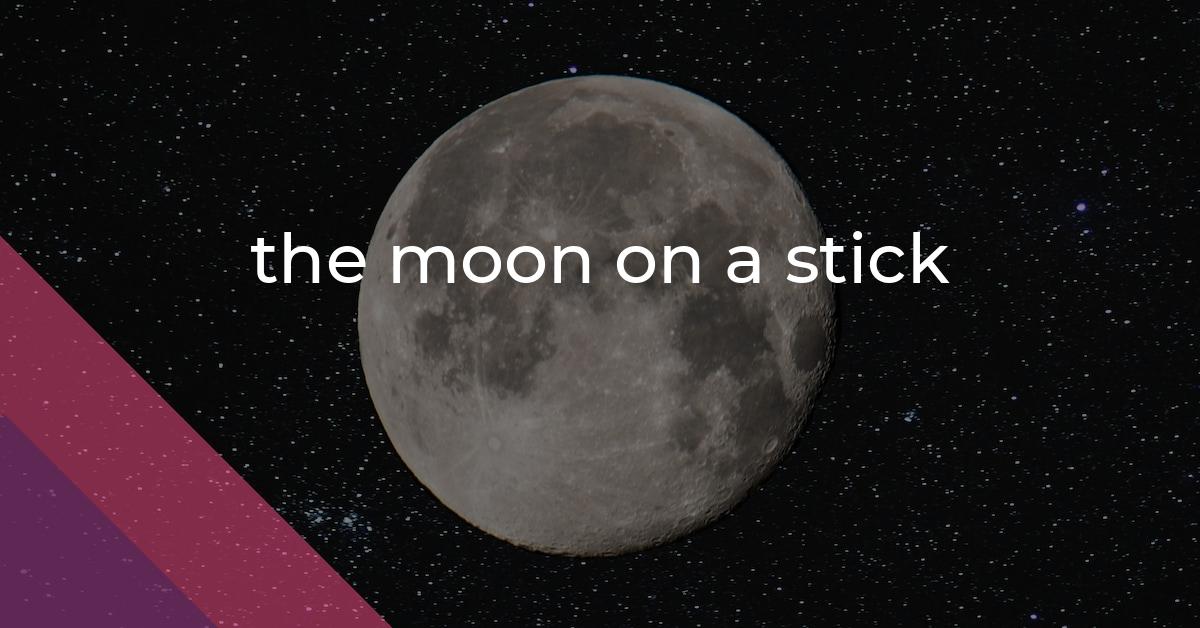the moon on a stick: Idiom Meaning and Origin
What does ‘the moon on a stick’ mean?
An idiom meaning an unrealistic or unattainable desire/expectation, often used to convey someone wanting something that is impossible to obtain.

Idiom Explorer
The idiom "that's saying something" is used to highlight a statement that is particularly noteworthy or impressive, often because it exceeds expectations or goes against common assumptions.
An idiom used to emphasize the extreme or exceptional quality of someone or something.
An idiom that refers to the difficulties or setbacks experienced at the initial stages of a new project, process, or endeavor.
The idiom "tall order" means a demanding or difficult task that is challenging to accomplish due to its complexity, magnitude, or high expectations.
An idiom meaning that one has to accept a situation or offer as it is, without the possibility of negotiation or change.
The idiom "stumbling-block" refers to an obstacle or difficulty that hinders progress or success.
An idiom meaning to leave or depart, often used to describe ending a project or leaving a place quickly.
The idiom "stop at nothing" means to be willing to do whatever it takes, without any boundaries or limits, to achieve a goal or desired outcome.
An "idiom" is an expression with a meaning that is different from the literal interpretation of the words. The idiom "sticking point" refers to a specific issue or problem that prevents progress or agreement in a discussion or negotiation.
Unveiling Coveted Illusion
According to my extensive research and knowledge about idioms, I have gathered several facts regarding the idiom "the moon on a stick." Here are the key facts:
"The moon on a stick" is a figurative expression commonly used in the English language. It is used to describe an impossible or unrealistic expectation. The phrase implies a desire for something unattainable or highly unlikely. It is often used sarcastically or dismissively to convey the absurdity of an unrealistic request or demand. The exact origin of the idiom is unclear, but it is believed to have originated in the mid-20th century. The idiom has gained popularity and is commonly used in both spoken and written English. Variations of the idiom include "the moon on a plate" or "the moon on a string," which convey a similar meaning.
Bearing these facts in mind, it is important to analyze the significance and meaning of "the moon on a stick" for a US audience.
The idiom "the moon on a stick" is deeply rooted in the English language and its usage reflects a universal human inclination towards desires that may be unattainable. The idiom functions as a powerful metaphor, conveying the idea of an impossible or unrealistic expectation. By invoking the image of the moon, an object located far beyond our physical reach and held in high regard for its mystique and beauty, the idiom emphasizes the implausibility of fulfilling such a request.
When used in conversation or writing, "the moon on a stick" serves as a rhetorical device to highlight the absurdity or impracticality of a demand or expectation. It is often employed to dismiss an unachievable proposition or to highlight the futility of pursuing an unattainable goal. The sarcastic undertones associated with this idiom imbue it with a sense of lightheartedness while also making a pointed commentary on the nature of human desires and aspirations.
Although the exact origin of "the moon on a stick" remains elusive, its prevalence in the English language suggests that it has become firmly ingrained in the cultural lexicon. Its usage has extended beyond its literal meaning, permeating various forms of communication. In contemporary American society, where ambition and the pursuit of dreams often take center stage, this idiom resonates as a reminder of the fine line between aspiration and fantasy.
Wishing for "the moon on a stick" is akin to wishing for the impossible. The idiom "I wish" encapsulates this sentiment, expressing a desire for something that may never come to fruition. It acknowledges the longing for the unattainable, similar to the idiom "the moon on a stick." However, "I wish" is a more personal phrase, reflecting an individual's yearning for something beyond reach.
An equivalent idiom that encapsulates the notion of unattainability is "a cold day in July." This idiom, with its self-evident meaning, emphasizes the unrealistic nature of a particular event or circumstance. Just as the moon on a stick is unattainable, so is a cold day in July. Both idioms highlight the impossibility or likelihood of a given scenario.
Similarly, the idiom "in your dreams" conveys the futility of a request or expectation. It dismisses an unrealistic proposition as wishful thinking, acknowledging its implausibility. This idiom aligns with "the moon on a stick" in its sarcastic undertones and the recognition of unattainable desires.
An alternate version of "in your dreams" is "in one's dreams," which serves as another expression of dismissal towards an unrealistic expectation. Both idioms share a sense of incredulity and highlight the impossibility of fulfilling a certain request or goal.
"the moon on a stick" is an idiom deeply ingrained in the English language, reflecting the universal human inclination towards desires that may be unattainable. The idiom serves as a metaphor for impossible or unrealistic expectations, invoking the image of the moon to emphasize the implausibility of such requests. It is often used sarcastically or dismissively to highlight the absurdity or impracticality of a demand or expectation. The idiom has become firmly established in the cultural lexicon and resonates with contemporary American society's pursuit of dreams and aspirations. The idioms "I wish," "a cold day in July," "in your dreams," and "in one's dreams" complement "the moon on a stick" by further emphasizing the unattainable nature of certain desires and expectations. These idioms collectively reflect the complexities of human longing and the fine line between aspiration and fantasy.
Example usage
Examples of how the idiom "the moon on a stick" can be used in a sentence:
- She always expects her boyfriend to do everything for her, like he's supposed to give her the moon on a stick.
- The politician made extravagant promises during his campaign, claiming he would give the voters the moon on a stick if they elected him.
- My boss asked for a report with detailed information, charts, and graphs, basically wanting the moon on a stick.
More "Desire" idioms



